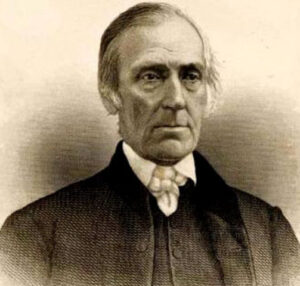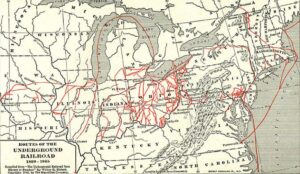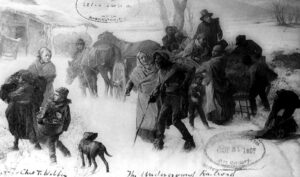
 In any kind of slavery situation, there are always people who are willing to help those who are being held against their will. Just like during the Holocaust, when the slaves were in trouble, people came to their rescue by forming the Underground Railroad. One hero of the Underground Railroad was Levi Coffin. In the winter of 1826-1827, fugitives began to come show up at the Coffin house. It started out as a well-kept secret and just a few slaves came, but the numbers increased as it became more widely known on different routes. These slaves were running away from bondage, beatings, and limitless working hours. Their lives were little better than death, and they knew they had to escape or die.
In any kind of slavery situation, there are always people who are willing to help those who are being held against their will. Just like during the Holocaust, when the slaves were in trouble, people came to their rescue by forming the Underground Railroad. One hero of the Underground Railroad was Levi Coffin. In the winter of 1826-1827, fugitives began to come show up at the Coffin house. It started out as a well-kept secret and just a few slaves came, but the numbers increased as it became more widely known on different routes. These slaves were running away from bondage, beatings, and limitless working hours. Their lives were little better than death, and they knew they had to escape or die.
When they arrived at the Coffin house, they were welcomed in and given shelter, they would usually sleep during the day, and then they were quickly forwarded safely on their journey. Neighbors who had been too fearful of the penalty of the law to help at first, saw how well the Underground Railroad was being run and soon they felt encouraged to help. A big part of the change of attitude came from the fearless manner in which Levi Coffin acted and the success his efforts produced. The neighbors began to contribute clothing the fugitives and aid in forwarding them on their way. They were still too afraid to shelter them under their own roof, so that part of the work fell to the Coffin household. There were the “content to watch” people, who obviously wanted to see the work go on…as long as someone else took the risk. And of course, there were those who told Levin Coffin he was wasting his time. They tried to discourage him and dissuade him from running such risks, telling him that they were greatly concerned for my safety and monetary interests. They tried to convince him that continuing this risky business could damage his business and possibly even ruin him. The told him he could be  endangering himself and his family too. I suppose it could have, because there are always those who sympathized with the slave-owners, but Levi Coffin could not stand to see the horrible treatment the slaves endured. He had to do something, no matter what it cost him, just like those who helped the Jews during the Holocaust.
endangering himself and his family too. I suppose it could have, because there are always those who sympathized with the slave-owners, but Levi Coffin could not stand to see the horrible treatment the slaves endured. He had to do something, no matter what it cost him, just like those who helped the Jews during the Holocaust.
Levi listened to these “counselors” and then told them that he “felt no condemnation for anything that I had ever done for the fugitive slaves. If, by doing my duty and endeavoring to fulfill the injunctions of the Bible, I injured my business, then let my business go. As to my safety, my life was in the hands of my Divine Master, and I felt that I had his approval. I had no fear of the danger that seemed to threaten my life or my business. If I was faithful to duty and honest and industrious, I felt that I would be preserved and that I could make enough to support my family.”
Even some of those people who were opposed to slavery, felt it was very wrong to harbor fugitive slaves. They figured that the slaves must be guilty of some crime, such as possibly killing their masters or committed some other crime in their escape attempts…making those who helped them an accomplice to the “crime” they were supposedly guilt of. Oh, they had every imaginable objection, and figured it was, at the very least, their duty to make their thoughts known. Once they had voiced their objections, their conscience was clear, and if Levi met with a tragic end, they could at least say, “I told him!!” Levi, in return asked one such “neighbor’s keeper” neighbor, if he thought the Good Samaritan stopped to inquire whether the man who fell among thieves was guilty of any crime before he attempted to help him? He said, “I asked him if he were to see a stranger who had fallen into the ditch would he not help him out until satisfied that he had committed no atrocious deed?” I suppose it was a “crime” to escape their masters, but then some laws should not be laws, and slavery certainly falls into that category. Levi Coffin had to follow his spirit and do what he felt God would expect of him, and in  the end, he saved many lives.
the end, he saved many lives.
Many of Levi’s pro-slavery customers left him for a time, and sales were down. For while his business struggled, but Levi knew that he was doing God’s will, and so God would take care of him and his business. Before long, new customers replaced those who had left him. New settlements were rapidly forming to the north and Levi’s own was filling up with emigrants from North Carolina and other States. His trade increased and his business grew. He says of this time in his life, “I was blessed in all my efforts and succeeded beyond my expectations.”


Leave a Reply